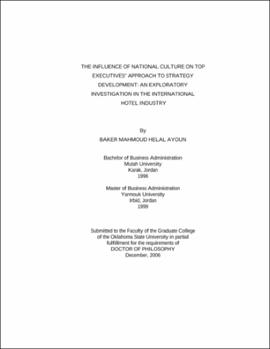| dc.contributor.advisor | Moreo, Patrick | |
| dc.contributor.author | Ayoun, Baker Mahmoud Helal | |
| dc.date.accessioned | 2013-11-26T08:33:18Z | |
| dc.date.available | 2013-11-26T08:33:18Z | |
| dc.date.issued | 2006-12 | |
| dc.identifier.uri | https://hdl.handle.net/11244/7201 | |
| dc.description.abstract | Scope and Method of Study: | |
| dc.description.abstract | This mail-based study empirically examined the potential influence of national culture on executives' approach to business strategy development. A total of 207 executives of upper-scale hotels from the U.S.A., Malaysia, Thailand and Turkey participated in the survey. Respondents were assigned their countries' status on Hofstede's five cultural dimensions of power distance, individualism, uncertainty avoidance, masculinity, and time orientation. In addition to the demographic and organizational characteristics of respondents, the instrument included items that measure several aspects that may differentiate between executives in the way they approach the task of strategy development. These aspects were: involvement in strategy development, content of strategic objectives, focus of strategic objectives, formality of strategic control, type of data used in strategic analysis, criteria for strategic evaluation, strategy evaluation time horizons, degree of rigorous analysis and rationality, strategic planning time horizons, openness to strategic change, and commitment to strategic decisions. Analysis of variance was used to test a set of hypotheses proposing that executives different in their national culture will express different beliefs toward these aspects. Hierarchical multiple regression was utilized to provide statistical control for the contextual variables. | |
| dc.description.abstract | Findings and Conclusions: | |
| dc.description.abstract | The findings of this study supported the notion that the strategic orientation and behavior of executives are culturally bound, and indicated that dissimilar approaches to developing business strategy are adopted by executives with dissimilar national cultural background. Among the five cultural dimensions investigated, the masculinity and long-term time orientation appeared to have the greatest influences, and uncertainty avoidance appeared to have little or no influence. Results for the other two dimensions, namely power distance and individualism, were not definitive and revealed interesting findings. Almost each aspect of executives' approach toward strategy development was affected to a greater or lesser extent. Implications for practice and suggestions for future research were discussed. | |
| dc.format | application/pdf | |
| dc.language | en_US | |
| dc.rights | Copyright is held by the author who has granted the Oklahoma State University Library the non-exclusive right to share this material in its institutional repository. Contact Digital Library Services at lib-dls@okstate.edu or 405-744-9161 for the permission policy on the use, reproduction or distribution of this material. | |
| dc.title | Influence of national culture on top executives' approach to strategy development: An exploratory investigation in the international hotel industry | |
| dc.contributor.committeeMember | Palakurthi, Radesh | |
| dc.contributor.committeeMember | Kim, Woo Gon | |
| dc.contributor.committeeMember | Hromas, James | |
| osu.filename | Ayoun_okstate_0664D_2012.pdf | |
| osu.accesstype | Open Access | |
| dc.type.genre | Dissertation | |
| dc.type.material | Text | |
| thesis.degree.discipline | Hospitality Administration | |
| thesis.degree.grantor | Oklahoma State University | |
